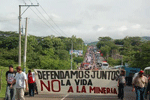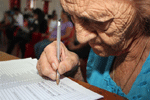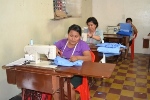El Salvador
Published on Mon, 2017-10-09 12:47

Demonstration against mining.
(Photo: Upside Down World)
|
El Salvador is the first country in Latin America and perhaps in the world to strictly prohibit all exploration and exploitation of underground metals, as well as open-pit mining. The Social Watch coalition of El Salvador welcomes this decision as “a triumph of the struggle carried out by different social organizations, which now have this legal tool to defend the environment and the lives affected”. However, they remind that “there has historically been a vacuum in the effective implementation of laws and agreements that guarantee the protection of the environment and vulnerable areas, mainly because of the lack of citizen participation in monitoring and implementing the laws”. They also demand with urgency a “comprehensive fiscal reform to effectively combat tax evasion and avoidance, thus guaranteeing needed revenues for implementing the SDGs”.
|
Published on Thu, 2016-06-30 23:11
Tax evasion and environmental vulnerability have been identified by Salvadorean civil society as the major obstacles to achieving the SDGs in El Salvador. Tax evasion in 2013 was estimated at $1.5 billion, more than one fourth of total government revenue. At the same time, the annual average of losses due to extreme weather events in the XXI century so far is "equivalent to almost 60 percent of the annual average of its public investment". It is urgent to take a development path that protects Nature from further degradation and strengthens ecosystems to reduce environmental vulnerabilities that mostly affect the poorest sectors of the population.
|
|
El Salvador was one of 60 countries selected by the United Nations Development System (UNDS) to implement the consultation phase of the Post 2015 Development Agenda. This allowed civil society organizations to generate a space for dialogue that led to the inclusion of priority issues for the country's development in the 2030 Agenda for Sustainable Development.
Subsequently El Salvador became one of fifteen countries selected for accelerated implementation of the SDGs, taking into account that goals and objectives such as safety, equity, health, quality education, growth, resilience and transparency had already been defined in the Five-Year Development Plan, as well as the progress made in achieving the Millennium Development Goals (MDGs). Among measures agreed between the UNDS and the Salvadoran Government is the creation of a National Council for Sustainable Development, composed of representatives from the Government, UNDS, civil society and the private sector.
Despite progress towards achieving the MDGs, El Salvador still lags on a number of important goals, particularly with regard to poverty reduction, gender equality and the environmental protection, either for lack of resources or lack of commitment. With the new Sustainable Development Goals (SDGs), the government has a new opportunity to establish guidelines for all sectors of the country to commit to implementation.
|
Published on Wed, 2014-05-14 14:17
Social Watch El Salvador has been executing a project called “Awareness and advocacy as tools for the financial education of the Salvadoran population and demanding a fair legislative framework for financial products.” The project has the objective of contributing to the generation of public opinion on abuses perpetrated by financial institutions that have an impact on the population generating negative impacts on poverty and human rights conditions.
|
Published on Fri, 2012-12-14 08:42

A Salvadorean woman learns to
write and read. (Photo: MINED)
|
The first leftist government in El Salvador has been devoted, in the last three years, to support marginalized populations such as the elderly, women, children and the rural population, says the Salvadorean contribution to the Social Watch Report 2013. Improvements in health and education are apparent, but structural changes are needed to ensure the sustainability of the social programs, including a tax reform to finance them with the national budget without relying on external funds.
|
|
Ya transcurrieron más de tres años desde el inicio del primer gobierno de izquierda en El Salvador, a cargo del Frente Farabundo Martí para la Liberación Nacional (FMLN). Su eje ha sido la ejecución de diversos planes de apoyo a sectores históricamente excluidos, como los adultos mayores, las mujeres, las niñas y niños y la población rural. Las mejoras en materia de salud y de educación son notorias, pero también lo es la necesidad de cambios estructurales, como una reforma fiscal que permita financiar con recursos propios programas sociales que dependen de fondos procedentes del exterior. Es un desafío clave para dotar de sustentabilidad a los avances logrados en este país tan sensible a los vaivenes económicos internacionales.
|
|
Source: 
. Published on Tue, 2012-09-04 07:42
|
Published on Tue, 2011-12-20 07:40

Demonstration against mining
in El Salvador.
(Photo: Upside Down World)
|
Hundreds of civil society organizations from all over the world are calling the World Bank and the International Centre for Settlement of Investment Disputes (ICSID), associate to the institution, to dismiss the demand of compensation initiated by Canadian company Pacific Rim against the Government of El Salvador, which forbade a cyanide-leach gold mining project presented by the firm.
|
|
The country faces big environmental problems, and the Government – although moving in the right direction - is not paying enough attention to them. To ensure environmental sustainability, the Government should continue to enact and implement environmental laws, many of which have been debated in recent years, and decide once and for all to make a firm commitment to international environmental protection agreements. The Durban talks on climate change may be an excellent opportunity to develop a national, long-term strategy and work towards ensuring the well-being of future generations.
|
SUSCRIBE TO OUR NEWSLETTER
Submit

|







